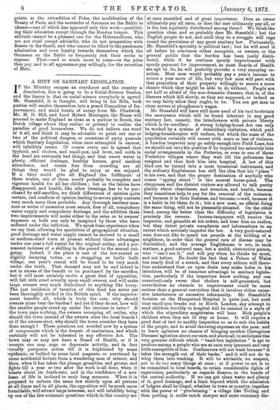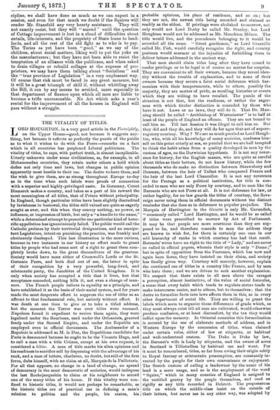A HINT ON SANITARY LEGISLATION.
or if the owners elect, why should the town consider they have done enough I These questions are avoided now by a system of compromise which is the despair of sanitarians, and which certainly will not be tolerated in any effective Act. The 'town may or may not have a Board of Health, or if it accepts one may urge or deprecate activity, and in fact 'usually postpones action till it is frightened by some
'epidemic, or bullied by some local magnate, or convinced by some accidental lecture from a wandering man of science, and then, when it has taken the plunge, grumbles, and groans, and
fights till a year or two after the work is all done, when it boasts about its death-rate, and in the confidence of a new lease of life is inclined to snub long sermons. When it is proposed to enforce the same law strictly upon all persons at all times and in all places, the opposition will be much more formidable, will attract large interests, and will infallibly bring up one of the few economic questions which in this country are at once unsettled and of great importance. Does an owner ultimately pay all rates, or does the user ultimately pay all, or is the loss equitably distributed among them? We think the question clear, and so probably does Mr. Stansfeld ; but the English people do not, and until they do a struggle will rage round the provisions of any great sanitary law. Fortunately, Mr. Stansfeld's specialty is political tact ; but he will need it all before he convinces either occupiers, or owners, or the general public that the burden has been justly distri- buted, while if he confuses speedy improvement with speedy payment for improvement, as most Boards of Health are apt to do, he will probably provoke a very annoying re- action. Most men would probably pay a year's income to secure a year more of life, but very few men will part with that proportion of their property willingly to secure a mere chance which they might be able to do without. People are not half so afraid of the non-dramatic diseases, that is, of the diseases which kill slowly, as they are supposed, or indeed as we may fairly allow they ought, to be. You can get men to clean sewers at ploughmen's wages.
Mr. Stansfeld will have still more need of his tact to obviate the annoyance which will be found inherent in any good sanitary law, namely, the interference with private liberty which is its corollary. A strong lodging-house Act can only be worked by a system of domiciliary visitation, which paid lodging-housekeepers will endure, but which the mass of the population certainly will resent with more or less of violence. A London inspector may go safely enough into Field Lane, but we should not envy his position if he inquired too minutely into social arrangements in the Potteries, or even in one of those Yorkshire villages where they wait till the policeman has resigned and then kick him into hospital. A law of this kind can be turned into a most tyrannical instrument, and the ordinary Englishman has still the idea that his " place " is his own, and that the proper destination of anybody who comes "spying about " is the nearest horse-pond. The clergyman and the district visitors are allowed to talk pretty plainly about cleanliness, and stenches, and health, because they sometimes help to pay for the removal of the nuisance, and because it is their business, and because,—well, because it is a habit to let them do it ; but a new man, an official doing the same thing, will not be pleasantly situated. On the other hand, among the better class the difficulty of legislation is precisely the reverse. Income-taxpayers will receive the inspector, and grumble at his orders, and bear him no malice, but they detest private complaints and informations to an extent which seriously impedes the law. A very good-natured man does not like to spend ten pounds at the bidding of a neighbour, in order that the general rate of disease may be diminished, and the average Englishman is not, in such matters, a good-natured man, but a stolid, obstructive person, who " can't see it," and will pay when he thinks he must, and not before. No doubt the fact that a Prince of Wales has nearly died of a stench, and that every artizan will there- fore understand that an open drain may make holes in his intestines, will be of immense advantage to sanitary legisla- tion, particularly if the inspectors know nothing, and can conscientiously swear that cholera is self-generated, but nevertheless no obstacle to improvement could be more serious than a general conviction that it involves either exces- sive interference or excessive inhumanity. Mr. Stansfeld's decision on the Hampstead Hospital is quite just, but next time small-pox breaks out in North London, any attempt to send children forcibly to hospital will be resisted in a style of which the stipendiary magistrates will hear. Rich people's children when they are ill stay at home. It will require a good deal of tact• to modify inspection so as to suit the habits of the people, and to avoid throwing expenses on the poor, and to leave agitators no chance of bringing another Contagious Diseases' agitation about our ears, and above all, to anticipate the very genuine ridicule which " band-box legislation " is apt to produce among a people who are at once very ignorant and very little susceptible of fear. Coalheavers will not wash because" it takes the strength out of their backs," and it will not do to whip them into washing. It will be advisable, we suspect, not to do too many things at once ; or if power to act is to be committed to local boards, to retain considerable rights of supervision, particularly as regards finance, in the hands of the central authority. If we can get clean water and plenty of it, good drainage, and a limit beyond which the admission of lodgers shall be illegal, whether in town or country, together with the power of "proclaiming " a village like Terling and then putting it under much sharper and more summary dis-
cipline, we shall have done as much as we can expect in a session, and even for that much we doubt if the Squires will render Mr. Stansfeld any very hearty assistance. They will not exactly resist, but they will " amend " until the question of Cottage improvement is lost in a cloud of difficulties about entails, life-interests, and the propriety of State loans to land- lords, and all the rest of the old fight as to who is to pay. The Tories as yet have been "good," as we say of the children, about social matters, liking well to put the yoke on the manufacturers ; but they have not been able to resist the temptation of an alliance with the publicans, and when asked to drain villages or rebuild collages at the expense of pro- prietors, we may have them talking about " Socialism " and the "true province of Legislation" in a very unpleasant way. Of course that risk must be faced in any great measure, but it will be a great triumph of skill if, without whittling away the Bill, it can by any means be avoided, more especially in that department of finance upon which all men are liable to become a trifle unreasonable. No Act which asks a year's rental for the improvement of all the houses in England will pass without a struggle.











































 Previous page
Previous page